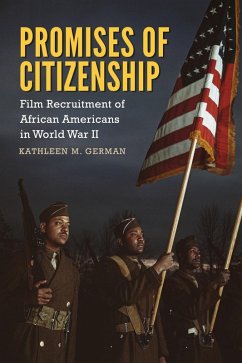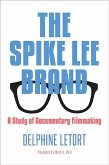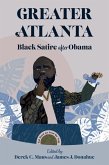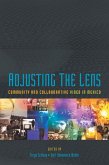Since the earliest days of the nation, US citizenship has been linked to military service. Even though blacks fought and died in all American wars, their own freedom was usually restricted or denied. In many ways, World War II exposed this contradiction.
As demand for manpower grew during the war, government officials and military leaders realized that the war could not be won without black support. To generate African American enthusiasm, the federal government turned to mass media. Several government films were produced and distributed, movies that have remained largely unexamined by scholars. Kathleen M. German delves into the dilemma of race and the federal government's attempts to appeal to black patriotism and pride even while postponing demands for equality and integration until victory was achieved.
German's study intersects three disciplines: the history of the African American experience in World War II, the theory of documentary film, and the study of rhetoric. One of the main films of the war era, The Negro Soldier, fractured the long tradition of degrading minstrel caricatures by presenting a more dignified public image of African Americans. Along with other government films, the narrative within The Negro Soldier transformed the black volunteer into an able soldier. It included African Americans in the national mythology by retelling American history to recognize black participation. As German reveals, through this new narrative with more dignified images, The Negro Soldier and other films performed rhetorical work by advancing the agenda of black citizenship.
As demand for manpower grew during the war, government officials and military leaders realized that the war could not be won without black support. To generate African American enthusiasm, the federal government turned to mass media. Several government films were produced and distributed, movies that have remained largely unexamined by scholars. Kathleen M. German delves into the dilemma of race and the federal government's attempts to appeal to black patriotism and pride even while postponing demands for equality and integration until victory was achieved.
German's study intersects three disciplines: the history of the African American experience in World War II, the theory of documentary film, and the study of rhetoric. One of the main films of the war era, The Negro Soldier, fractured the long tradition of degrading minstrel caricatures by presenting a more dignified public image of African Americans. Along with other government films, the narrative within The Negro Soldier transformed the black volunteer into an able soldier. It included African Americans in the national mythology by retelling American history to recognize black participation. As German reveals, through this new narrative with more dignified images, The Negro Soldier and other films performed rhetorical work by advancing the agenda of black citizenship.
Dieser Download kann aus rechtlichen Gründen nur mit Rechnungsadresse in A, D ausgeliefert werden.









